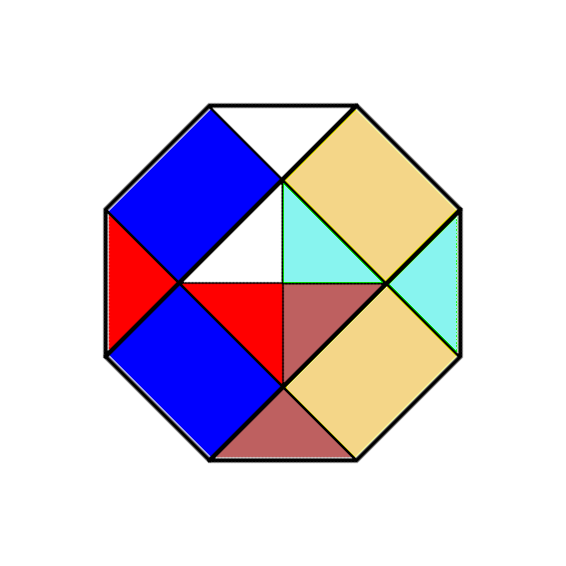“We discover in ourselves what others hide from us, and we recognize in others what we hide from ourselves.” — Vauvenargues
Author: Greg Ross
Half Measures
A problem from the January-February 1991 issue of Quantum:

Prove that the area of the yellow rectangle is half that of the full octagon.
Bother
Apocryphal but entertaining: Allegedly the Duke of Wellington sent this letter to the British War Office during the Peninsular War of 1808-1814:
Gentlemen:
Whilst marching to Portugal to a position which commands the approach to Madrid and the French forces, my officers have been diligently complying with your request which has been sent by H. M. ship from London to Lisbon and then by dispatch rider to our headquarters.
We have enumerated our saddles, bridles, tents, and tent poles, and all manner of sundry items for which His Majesty’s Government holds me accountable. I have dispatched reports on the character, wit, and spleen of every officer. Each item and every farthing has been accounted for, with two regrettable exceptions for which I beg your indulgence.
Unfortunately, the sum of one shilling and ninepence remains unaccounted for in one infantry battalion’s petty cash and there has been a hideous confusion as to the number of jars of raspberry jam issued to one cavalry regiment during a sandstorm in western Spain. This reprehensive carelessness may be related to the pressure of circumstances since we are at war with France, a fact which may have come as a bit of a surprise to you gentlemen at Whitehall.
This brings me to my present purpose, which is to request elucidation of my instructions from His Majesty’s Government, so that I may better understand why I am dragging an army over these barren plains. I construe that perforce it must be one of two alternative duties, as given below. I shall pursue either one with the best of my ability but I cannot do both:
- To train an army of uniformed British clerks in Spain for the benefit of the accountants and copy-boys in London, or perchance
- To see to it that the forces of Napoleon are driven out of Spain.
Your most obedient servant,
Wellington
Black and White
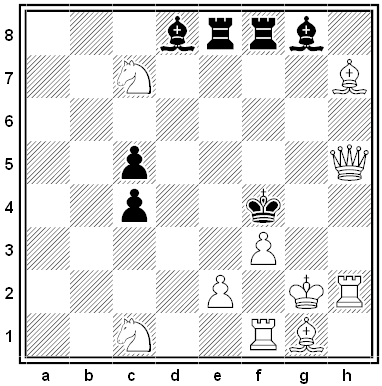
Thomas Taverner published this remarkable problem in the Dubuque Chess Journal in 1889. White is to mate in two moves.
Noted
Sir,
The hymn ‘Onward Christian Soldiers’, sung to the right tune and in a not-too-brisk tempo, makes a very good egg timer. If you put the egg into boiling water and sing all five verses and chorus, the egg will be just right when you come to Amen.
— Mrs. G.H. Moore, letter to the Daily Telegraph, 1983
Arithmetic

Writing home from Princeton in 1939, 21-year-old Richard Feynman challenged his father to solve “this problem in long division. Each of the dots represents some digit (any digit). Each of the A’s represent the same digit (for example, a 3). None of the dots are the same as the A (i.e., no dot can be a 3 if A is 3).”
We don’t know whether his father succeeded — the solution is quite involved:
A Second Life
Psychoanalyst Robert Lindner received a remarkable client at his Baltimore practice: “Kirk Allen” had read a series of science fiction novels and “In some weird and inexplicable way I knew that what I was reading was my biography.” (Lindner never revealed which series this was, but some have theorized that it was the Barsoom books of Edgar Rice Burroughs, which describe the adventures of an American Confederate veteran on Mars.)
Allen believed that he could assume his fictional identity at will and was spending part of his life on another planet. In an effort to understand his own history he’d compiled his life story, working from the books and supplementing the account with his own invented memories. Lindner asked to see this work:
There were, to begin with, about 12,000 pages of typescript comprising the amended ‘biography’ of Kirk Allen. This was divided into some 200 chapters and read like fiction. Appended to these pages were approximately 2,000 more of notes in Kirk’s handwriting, containing corrections necessitated by his more recent ‘researches,’ and a huge bundle of scraps and jottings on envelopes, receipted bills, laundry slips. There also were a glossary of names and terms that ran to more than 100 pages; 82 full-color maps carefully drawn to scale, 23 of planetary bodies in four projections, 31 of land masses on these planets, 14 labeled ‘Kirk Allen’s Expedition to –,’ the remainder of cities on the various planets; 161 architectural sketches and elevations, all carefully scaled and annotated; 12 genealogical tables; an 18-page description of the galactic system in which Kirk Allen’s home planet was contained, with four astronomical charts, one for each of the seasons, and nine star-maps of the skies from observatories on other planets in the system; a 200-page history of the empire Kirk Allen ruled, with a three-page table of dates and names of battles or outstanding historical events; a series of 44 folders containing from 2 to 20 pages apiece, each dealing with some aspect — social, economic, or scientific — of the planet over which Kirk Allen ruled. Finally, there were 306 drawings of people, animals, plants, insects, weapons, utensils, machines, articles of clothing, vehicles, instruments, and furniture.
To free Allen from his delusion, Lindner eventually entered it himself, validating the fantasy and repeating Allen’s ideas in the same language. This worked: After some time Allen confessed that he no longer felt that his alternate identity was real. Lindner published his account of the therapy in two articles in Harper’s Magazine in 1955 and elaborated them in his 1955 memoir The Fifty-Minute Hour. Allen’s identity remains unknown, but there’s some speculation that he was Paul Linebarger — who himself wrote science fiction under the name Cordwainer Smith.
It’s A Small World After All
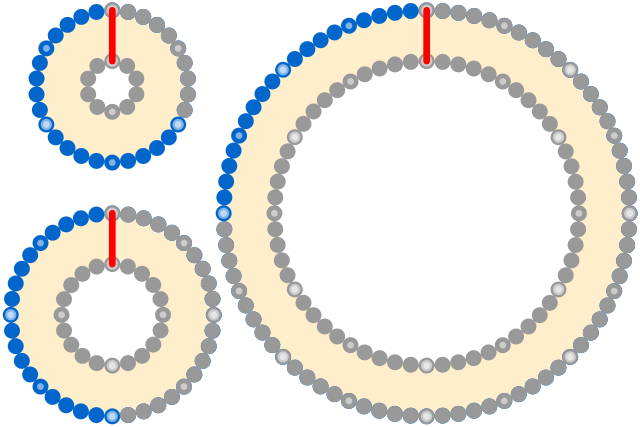
A popular mathematical puzzle asks: Suppose Earth were perfectly spherical and wrapped with a string at the equator. If we wanted to raise the string 1 meter off the ground, all around the world, how much longer would it need to be?
Surprisingly, the answer is only about 6.3 meters. A circle of radius r has a circumference of 2πr. We’re adding a meter to the radius, so the circumference increases by 2π meters.
Even more remarkably, this remains true regardless of the size of the sphere. Above, the increase in the circumference (blue) remains the same for a sphere of any size — it’s determined entirely by the additional radius (red).
The shape need not even be a sphere! Below, when the string is raised one meter (red) outward from the perimeter of either square, the string’s total length increases only by the combined length of the four blue arcs, which together equal the circumference of a circle of radius 1, or 2π meters.

Post Apocalypse
Two sadistically addressed letters, from the Strand, August 1897:
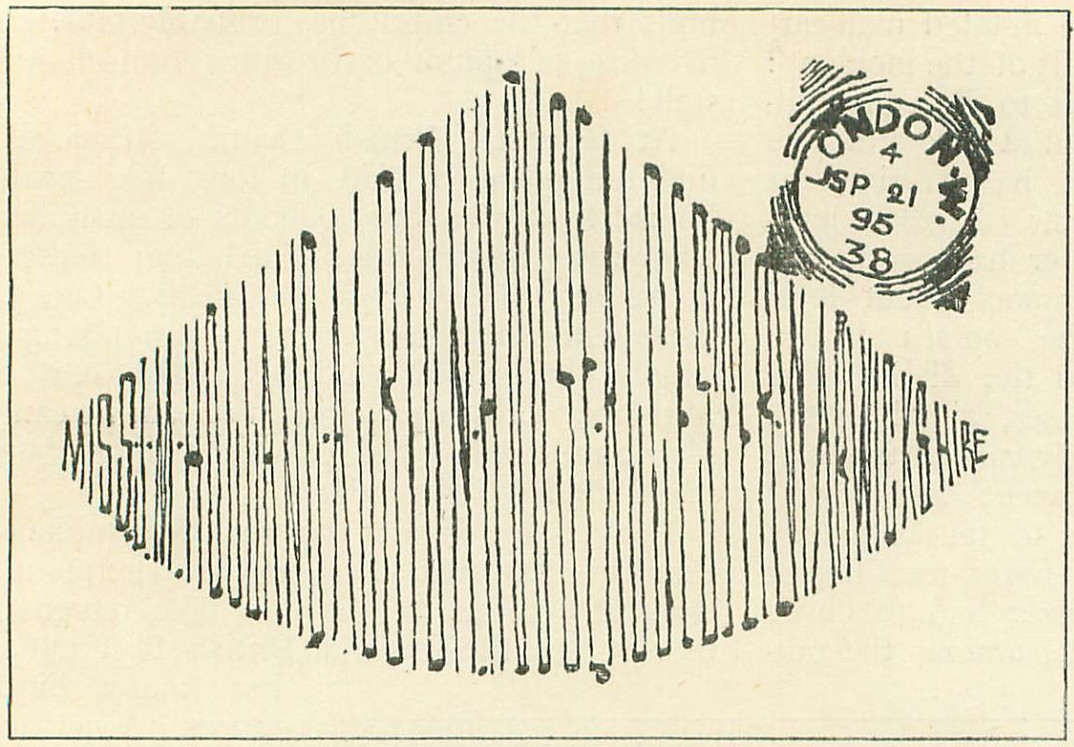
“The accompanying envelope looks hopeless at first glance. It is a fair sample of the kind of thing which is specially invented to try the patience of the splendid staff of officials at the G.P.O. Hold it horizontally, on a level with the eyes, and you will read the address: ‘Miss J. M. Holland, Albion House, Alcester, Warwickshire.'”
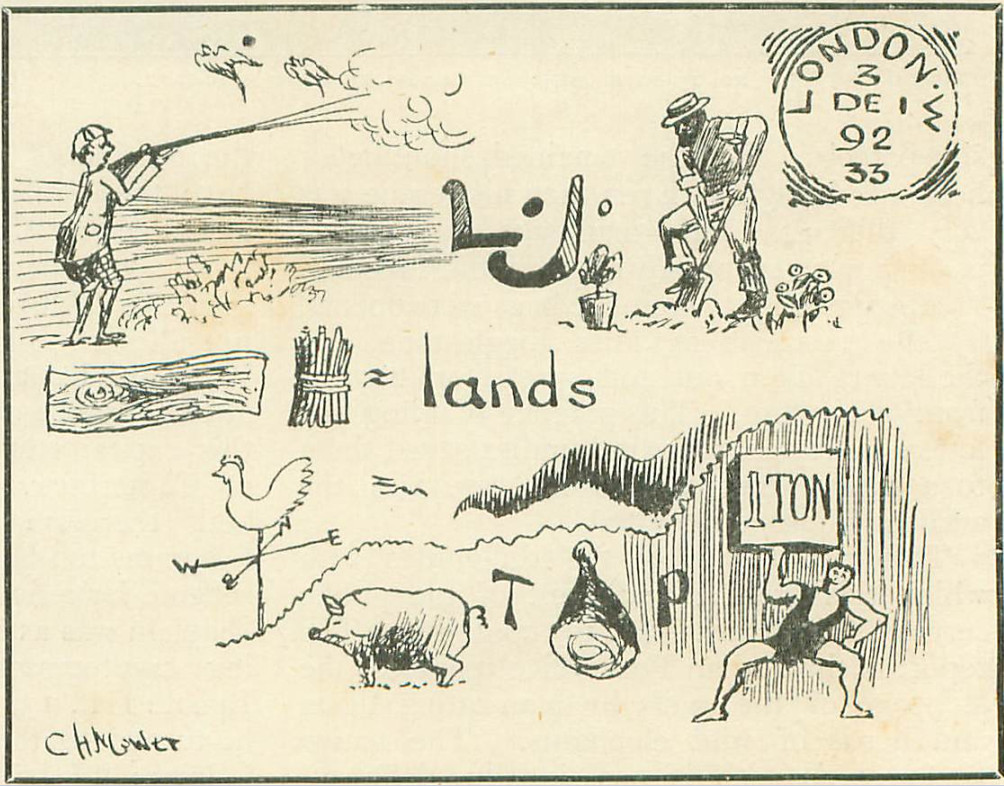
“The next reproduction, specially photographed from the Curious Address Books at the G.P.O. Museum, is even more typical of mis-directed ingenuity. This is a picture-puzzle, the address being: ‘Miss L.J. Gardner, Woodlands, West End, Southampton.'”
Moonlighting
Is Dracula Moriarty? Is Holmes Van Helsing?
In an article in the Baker Street Journal Christmas Annual of 1957, William Leonard points out that the events of Bram Stoker’s novel unfold between May and November 1890, a period in which Watson records only three cases with Sherlock Holmes. Stoker’s novel cites several news accounts about the growing mystery, which would certainly have attracted Holmes’ attention. In order to intervene, he would have had to hide his identity to conceal the danger that confronted the women in the tale, who Stoker tells us are in such fragile health that any shock might kill them.
Van Helsing arrives ostensibly from Amsterdam, an intrepid polymath with a poised head; a hard, square chin; a long, straight nose with sensitive nostrils; and brows that knit deeply over a problem. He is older than Holmes, but we know that Holmes can affect that appearance. Both investigators use the same methods, and both are expert housebreakers. Supposedly a doctor, Van Helsing does not appear to be acquainted with medicine (“the professor’s actions were certainly odd and not to be found in any pharmacopeia”). And, strangely, his inexpert English becomes articulate when he’s under stress: “You do not let your eyes see nor your ears hear, and that which is outside your daily life is not of account to you.”
As for Dracula, both he and Moriarty are tall, thin, pale, and gray-haired — Dracula has a “lofty domed forehead” and Moriarty a “forehead doming out in a white curve.” Jay Finley Christ writes, “Moriarty and Dracula were two names for the same man. Mr. Holmes had been after him for over three months and began to catch up with him in January. Moriarty-Dracula knew this all the time, but Watson didn’t get it. If he had, he probably would have told the world about it before Bram Stoker got round to it in 1897.”

